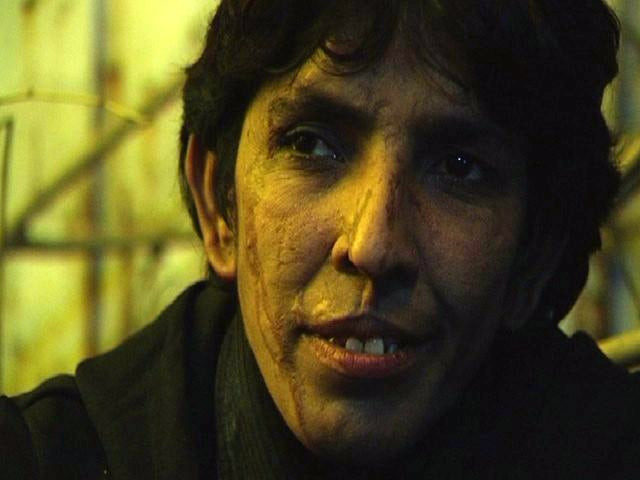My mornings were dedicated to riaz (practice) of classical music and I either painted or read the whole day. Exactly like some typical ‘crazy artist’ character portrayed by Dostoevsky.
One day while playing the harmonium, I saw a little girl who was peeping inside from the old, wooden window. Upon realizing that I had noticed her, she smiled shyly and ran away. She was hardly 12 years old.
I can never forget the glimpse of those curious, lively eyes. The next day, I saw her again playing with other children in the street.
I remember I was holding a canvas and other painting material. We had an eye contact for a split second and exchanged a smile. I entered my room and as I was putting my things away, someone knocked at the door and I heard a very sweet voice call out:
“Paint walay bhai, mei ander aa jaoon?” (May I come in, painter-brother?)
That sounded innocent beyond imagination. It had been a few months since I was living there and she was my first guest ever. I asked her name and she said:
“Noori.”
I asked whether she knows the meaning of her name. She replied:
‘’Noori ka matlab hai roshni!” (Noori means, light!)
We chatted for about an hour and I was amazed to realize how intelligent she was. She told me that she had been secretly observing me from the window for many days. On asking the reason she said something I did not expect at all:
“Molvi sahab says painting and music is forbidden. I wanted to see how these forbidden things look like.”
All I could explain to her little mind was that things that don’t hurt anyone and spread love are not forbidden. She started visiting me almost daily for the next couple of months till I lived there. She loved to observe me paint or play music. One day, she came for a while and looked very anxious. She said:
“Paint walay bhai, my marriage has been fixed. Mother says this is the last year of my childhood.”
I remained silent. It made me really sad but I was not surprised. She was going to be one of those thousands of victims of child-marriage in Pakistan. Then, all of a sudden, she said something that hit me really hard.
“Paint walay bhai, will you please paint me? I want to save my childhood.”
The next day, I started making her portrait. For some reason, I was really melancholic. She was so impatient that she came again and again to see her image. I used very bright colors and tried to capture her lively smile and those dazzling, little eyes. Finally when I handed her the portrait, she started running towards her house, shouting and calling her friends that her childhood had been saved.
I decided to move back home a few days later. Before leaving, I visited Noori’s house and met her mother. I found out that Noori was the eldest among her four sisters, something her mother told me with grief. Noori was so excited about her portrait that she hung it in the only room of their house.
I remember the last words she said before I left:
“Paint walay bhai there’s a mistake in this painting. You’ve also painted a candle but there was no candle in that room.”
She was right.
I painted a source of light failing to realize that Noori’s life would remain dark in years to come.
*******************************************************************
A few days back, I was visiting the walled city of Lahore for some research. I went to the narrow streets of the Lahori Gate after so many years and was amazed to see how nothing had changed at all.
By sunset, it had started raining and I was hoping to get some tea from a nearby Dhaaba when I saw him. He was standing under an old, leaf-less tree and was staring very oddly at me. When I noticed him, the stranger started walking towards me, very slowly, as if lost in deep thought. That burnt, disfigured face, strange walk and those expressionless eyes, certainly grabbed my attention. He was staring deep into my eyes as if he recognized me. Holding my cup of tea, I was a bit confused and tried avoiding him but he sat right in front of me and whispered…
“Paint walaybhai…’’
He was Noori!
Known as Noor, an ordinary, ugly guy who works as a labourer, she now lives pretending to be a man.
She lighted her cigarette and said:
“My husband burnt my face with acid. An ugly man is still acceptable in society but not an ugly woman.”
Getting married to a drug addict, being brutally tortured every other day and ending up as an acid victim – Noori’s story is not something new for our barbarian society. But what really sets her apart from other victims is what she has turned out to be.
The acid not only burnt her face but also her identity.
She had to be a ‘man’ for her younger sisters, playing a role of not only a bread-winner but also a father figure. She told me how she looked for work but no one was willing to hire an acid-victim.
‘She’ has now been forgotten by everyone.
Only ‘he’ is known.
Noor, a guy who fights with other boys when they tease his sisters, who smokes and plays snooker in the streets and who has a more masculine walk.
“When I saw there’s no place for Noori anymore, I cut my hair, changed my clothes and that’s how Noor came into being”
Noori’s life is tragic but it could’ve been more so had she waited silently for her death, being locked in a room and ashamed of being an acid-burnt woman.
Instead she decided to fight.
In order to gain her confidence back, she changed her identity because sadly, confidence associated with one gender in our patriarchal society. Owing to her hard work, her sisters are getting an education and that’s the success of her struggle.
Behind the persona of an ugly Noor, lives the strong and beautiful Noori.
I asked her:
“Do you have any hope for future?”
She didn’t hesitate:
“No. But I’ll keep walking and maybe someday I’ll say with pride that I’m a woman.”
We talked for hours that night. I walked her to her home. She asked me to wait for a minute and went inside. When she came back, she held that portrait that I had made of her.
The colors were not that bright anymore.
With tears in her eyes she said:
“Paint walay bhai that’s the only place where Noori lives now.”
I couldn’t help myself either…
[[http://www.youtube.com/watch?v=oGWecsbloH4&feature=player_embedded]]



COMMENTS
Comments are moderated and generally will be posted if they are on-topic and not abusive.
For more information, please see our Comments FAQ